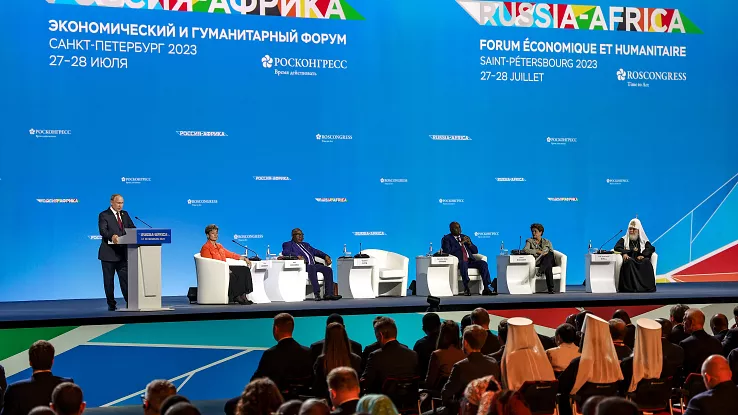Russia-Africa summit in St Petersburg -Putin promises grain exports to Africa despite sanctions
Russian President Vladimir Putin has said his country will continue to export grain, including some free shipments, to Africa despite sanctions.
While discussing the halted Black Sea grain deal at the Russia-Africa Summit in St Petersburg, he promised large no-cost shipments of grain to six African countries.
“Our country will continue to support needy states and regions, in particular, with its humanitarian deliveries,” said Putin.
“We seek to actively participate in building a fairer system of the distribution of resources. We are taking maximum efforts to avert a global food crisis.”
He referred to the difficulties of maintaining the supply with what he called “illegal sanctions” which “seriously impede the supply of Russian food, complicate transportation, logistics, insurance and bank payments.”
Delegates from many African nations called for an effective deal on grain shipments.
Chairperson of the African Union and President of the Union of Comoros, Azali Assoumani, said: “An agreement [on grain supplies] must be possible to try to save thousands of people who are dependent on these imports.
“Africa’s economic food security will be most at risk, especially since the continent is already badly affected by food price shocks caused by the interruption of its supplies.
“We, therefore, urge the stakeholders to find common ground to allow the resumption of employment, to secure grain from Ukraine and Russia to our continent.”
The summit follows Russia’s withdrawal from a deal that allowed Black Sea exports, vital to many African countries, a move that drew a strong condemnation around the world and raised new threats to global food security.
Putin said that Russia made the decision to withdraw from the deal because “none of the terms of the deal, concerning the withdrawal of Russian exports of grain and fertilisers to world markets from sanctions, was fulfilled.”
What’s at stake at the Russia-Africa Business Summit
Many African countries have taken a neutral stance over the conflict in Ukraine, as they seek to strike a delicate balance between relations with Russia and Western allies.
And yet, Russia’s decision to invade Ukraine, and most recently to end a grain deal that allowed safe passage of grains from Ukraine has led to higher food and oil prices for many African nations.
The second Russia-Africa Summit which aims at bringing about a “new level of mutually beneficial partnership” between Russia and the African continent comes as Moscow continues to wage war against Ukraine.
Gustavo de Carvalho is a Senior Researcher on Russia-Africa ties in our African Governance and Diplomacy Programme at SAIIA and Oleksandra Matviïtchou, Ukrainian lawyer and Nobel Peace Prize Laureate joined us for more insights
– Angolan kwanza’s fall stokes inflation pressure –
The Angolan kwanza is one of the worst-performing African currencies this year as low oil prices and an increase in debt payments have made it harder for the central bank to prop it up. Our Angolan correspondent provides a report on the update on the country’s economic and financial situation.
– Gabon: the Nkok Special Investment Zone
Meeting in Libreville, 18 countries from across the continent signed the statutes governing the operation of the Association of Administrative Management Bodies of African Economic Zones, with the aim of competing more effectively with other regions of the world in emerging markets. Here are the details of this from our correspondent in Gabon.


DONATION TO SUPPORT THIS WEBSITE: 0599896099 +233599896099 Thank you for your contribution!
Related




















































